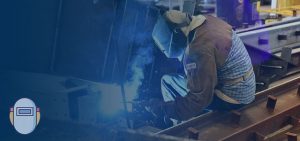Experienced welders believe that manufactures and construction industries require to invest in human labor and building materials.
Thus, traditional welding methods take most of the labor costs.
In comparison, GMAW can reduce total overhead by 25%.
It provides high welding speeds and long arcing intervals without interruption.
Indeed, GMAW is a common method of welding.
Therefore, the participants of the programs should know the main features of this technology.
Here you can learn more about tools, applications, and advantages of GMAW.
GMAW Definition
To start with, GMAW (gas metal arc welding) is the process of joining metals by fusion with an electric arc burning.
The burning is between the continuously fed melting electrode and the product.
Gas is protecting the arcing zone in the process of welding.
In fact, the shielding gas and the movable melting electrode are two of the mandatory parts of this process.
The main function of shielding gas is to exclude contact of molten metal with the surrounding atmosphere.
In this way, a solid welding seam is formed.
Tools
You may need one of the three types of welding guns (a hand-held, robotic or machine-controlled) depending on the technique.
Respectively, you can choose a semi-automatic, automatic or machine technique.
Semi-automatic welding is almost like manual welding.
The difference is the welding machine has a spool with welding wire.
This means that semi-automatic welding requires manual movement of the welding wire.
On the contrary, the automatic tool will move automatically.
Notably, automatic welding is effective in more serious projects.
Application Of GMAW
Engineers often use GMAW instead of coated electrodes.
Shipbuilding and other heavy industries apply GMAW technique with respect to the thicknesses of more than 1.5 mm.
This is applicable for products made of conventional low-carbon, heat-resistant, corrosion-resistant and stainless steels.
Due to its many advantages, many industries apply GMAW welding.
Advantages Of GMAW
In addition to different applications, GMAW has the following advantages:
- high welding speeds and long arcing intervals without interruption (as there is no need for frequent electrode changes);
- practical absence of electrode wire losses;
- formation of dangerous defects of the welded seam is lower in comparison with solid wire welding.
What is more, GMAW is better economically.
Besides, a welder can work with either thick or thin metals.
Finally, GMAW suits for most metals.
To sum up, welding has a wide range of applications, so this technique is necessary for everyone who plans to become a certified welder.
This page is also available in Spanish.











